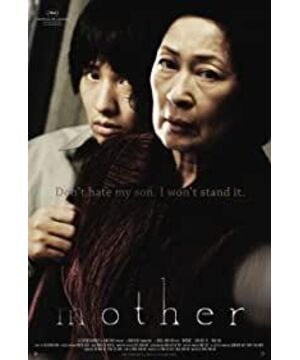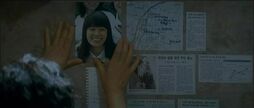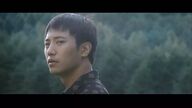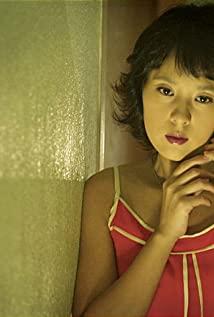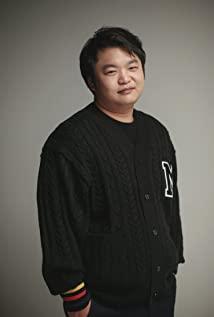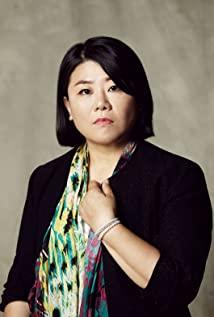Broadly speaking, this metaphor is about people’s distrust, endurance and limits, about the coldness of (social) mechanisms, about the survival of odd people, about the cruelty and unknowability of the truth, and about the horror of memory and the need to forget... …These kinds of problems, in fact, permeate the fate of the individual and the grand narrative in the film. As a result, the camera had to wander through twists and turns, trying to show multiple levels of a social fabric, showing the multiple states and possibilities of people, instead of the general reasoning crime film, after pulling the cocoon, it must go straight to the main point (Finally, We still can't guess the ending, but we seem to experience more things and feel deeper).
Of course, what needs to be said most here is that this "very city house" characteristic also permeates every audiovisual language.
(1)
The paragraph I chose is about Zhenyu and Yuanbin who were dissatisfied with a professor and his colleagues who drove into someone and ran away. They waited at the golf course and then chased and chased this group of so-called "upper people." It is lively. This section is the earliest "little climax" of the film, which appeared in the first six minutes and is worth talking about.
First of all, the entire paragraph fully demonstrates the director's control. From "lurking" to "pursuing", from the vast vision to the close-up "cold switching", etc., whether it is scene scheduling or camera movement, or the incorporation of actor's actions and lines, all seem to be overweight. Smooth and skilled, the details are even more exquisite.
At the beginning, the audiovisual of the first shot was quite courageous-Zhenyu appeared on the horizon from the valley, (the third person's perspective at this time), the camera slowly slid forward, faster and faster, Zhenyu was far away Seeing something everywhere, he leaned down quickly, and the suspenseful and disturbed flute soundtrack also sounded. According to the general logic, the way to save trouble at this time should be to cut directly to what he sees, which is simpler and more direct. But the director didn’t cut, and chose a very complicated and troublesome long shot here—the camera was pushed and shaken, accompanied by the sound of whining, so that the vast grass slowly passed in front of him, until it moved to the direction of the far trail. When a cream-white golf cart entered the field of view, the camera stopped steadily.
If this lens is still a "half subjective point of view," the next astonishing lens is a terrifying "omnisighted point of view" (the camera is almost on the edge of the field), and Yuan Bin, Zhen Yu and Professor The location of a group of people and the "largeness" of the golf course are undoubtedly revealed. It may also mean that "people are watching the sky" (personal guess). The third lens is very abrupt, turning into a close-up of a pile of golf clubs shaking behind the car-the extremely far field of view of the second lens and the extremely close field of view of the third lens constitute a very impactful "Intertextual" effect.
The fourth shot depicts the "ecology" of the professor and the group of people in the car. With just a few seconds of accurate tracing of the lens, you can faintly guess the identity, status and relationship of these people. Here, it is completely dependent on the choice of scene (close-up) and the arrangement of the internal position of the lens (two fronts and three rears). ), as well as the appearance and expression of the characters (the arrogant old man sitting in the front passenger seat must be a professor, the driver is a colleague, and the two men and a woman in the back seat are the attendants). The most difficult part here is that there is humor. Hidden inside, and faintly revealing the real-world interpersonal flow, it seems like a big deal.
One more thing here, Feng Junhao wants to describe the tragedy of "non-social people" ("mother and son" as a typical example of breaking away from the normal social network), and its foothold must be a strong sense of social reality. For example, the whole film has a cold temperament, a gloomy style, and has repeatedly put "realism" as the first, and even some passages, the revealing of the truth and cruelty is creepy. However, this paragraph is slightly different-the "reality" is inserted into a kind of quiet and noisy cold humor, on the surface it is full of fun, thinking about it, but not all that-the extended meaning of the paragraph is also an allusion Some form of social injustice-a university professor, with the support of a group of touts, goes to a luxury golf course to play, and hurts someone but can be fine, while the joke of "retaliation" makes the poor family who can't open the pot pay compensation The huge cost of repairing the car (Where does the heavens survive?)-It's just that, the director hides them in the depths of the narrative (potential undercurrent), which is not expressly intended or easy to detect.
Going back to the analysis of audiovisual language, the following passages of trails and groves use the prop of "moving car" very cleverly. The lens is constantly sliding, and Yuan Bin and Zhenyu's two running displacements of holding the wooden sticks gradually create a kind of tension and atmosphere with a sense of joy. For example, many lenses are mounted on the car to take pictures, instead of the subjective perspective of the person in the car, and when the car is turning, it is accompanied by a 90-degree pan (because the person’s neck can be twisted), and the next one is reversed. The shots are all inexplicable and confusing close-up shots of this group of people (and even collectively turning their heads). In addition, when the car (camera) is close, the person (Yuanbin) retreats, the car (camera) is chased by the person (Zhenyu), and Zhenyu chases and throws a stick at the car (subjective lens), There was even a frightening "Wow" yelling from behind the camera, changing from low to high. As a result, the whole scene seems a bit funny and more "immersive", and the sound of the "clank" musical instruments in the background obviously has the effect of adding fuel to the flames and setting off the atmosphere.
The last part of a very long shot, where Yuan Bin and Zhen Yuwei beat three "respected" middle-aged men in one go, is very exciting, especially when Zhenyu secretly throws his cue into the lake in the middle, and the shot is "puffing" with the cue. After entering the water, they turned back without haste, and continued to pay attention to the scene of their scuffles, which appeared to be extremely calm and relaxed. In fact, the reason why this passage is shot in this way is not just to show off skills, but to balance the grammar of "long and short sentences". In other words, the balance between long shots and short shots is the key to the pros and cons of the "rhythm" of the entire paragraph, and it is also an important part of whether the final "smell" can come out.
So let's look at this paragraph again. At the beginning, it was a 22-second long mirror (an outline of the entire space), but I don’t know if it was a coincidence. The final scuffle mirror was also 22 seconds. In the middle, most of the front and back shots (although they are weird front and back shots) are all shot in 3 to 4 seconds. They are quickly edited together, which makes people dizzy, and there is an upset near the end (a 12 The side view and mirror of Zhenyu chasing car in seconds). The basic rhythm of the whole passage is "slow-quick-slow", with long echoes from the beginning to the end, and there is a burst of quick drums and zithers in the middle. Therefore, the psychological feeling of this paragraph is quite exciting, but it is endless aftertaste.
(2)
From the perspective of the plot, this seems to be a very happy "vent", an irregular narrative. In fact, three narrative tasks are secretly handled. One is to bury the foreshadowing of golf and golf clubs (these two props have extremely important clues in the subsequent plot); the other is to describe Zhenyu and Yuan in depth. The character and relationship of the two characters of Bin (one is a strong and deliberate gangster, the other is a naive and innocent fool, the latter obviously regards the former as an idol, while the former has contempt for the latter); the third is, Through a play, it depicts a vertical social picture, the disparity between the elite and the disadvantaged. Of course, the latter will also have explosive resistance, although such "riots" will inevitably be punished, such as Yuan Bin as the lowest level. , By the "cold violence" of the society and law enforcement agencies-a huge compensation for Mercedes-Benz rear mirrors.
And this jubilant passage is the "hot violence" jointly carried out by Zhenyu and Yuanbin. On the one hand, it stems from their youth and enthusiasm for fear that the world will not be chaotic. On the other hand, it contrasts the cowardice and loss of vitality of the professor and the group. Without the maintenance of the state machinery, it can only be beaten. As for Zhenyu, he thinks about letting Yuanbin take all his faults before he can do whatever he wants. Attack from behind).
In fact, through this rhythmic and powerful passage, I can already clearly see how a powerful repression system in "Mother" is cleverly built (although this passage is actually anti-repression, and other parts) The plot is completely different). Just as Feng Junhao did in his stunning work "Reminiscences of Murder", to push a person into desperation, he must first show the unreliability of social organizations (professors, lawyers and other elites are exposed and do whatever they want), judicial enforcement Waiting for the high degree of implausibility of the authority (the police played an extremely ridiculous and ridiculous role in the case)-so "public power" was completely denied, the "state" lost its basic internal fairness, and the entire social system gave way The chilling problem.
The most frightening thing is that "Mother" is not only discouraged by the concept of "public", and even the world of "private" does not give people the slightest hope. It is still the prison of "others are hell"-friendship is not credible (friends) Recognizing money but not people), family affection is also untrustworthy (the grandmother of the victim girl lives on her money from prostitution, but is indifferent to her death; the mother who firmly believes that her son is not a murderer, finally collapsed under the "truth"). Under such a structure, the loneliness of human beings is manifested to the extreme, just like in the scenes at the beginning and the end, the mother numb in the wasteland, she killed people but no one can tell, she fears that her son will always have One day she will know that she and she have killed people. She tries to forget the memory by piercing the acupuncture points on her legs.
At the same time, we can see more clearly how "non-social people" in the traditional sense have been ruthlessly deleted in this collapse of trust. First, the mother and son Yuanbin were constantly discriminated against (the son was indifferent to his mother's concern for him), and the living space was deformed, but his son Yuanbin was imprisoned because of injustice. Then, Yuan Bin suddenly recalled something in prison and shouted to his mother: "When I was five years old, you wanted to poison me!" The modeling between the mother and the child was instantly destroyed. And at the end, there is a stronger "weak" food meaning for the weak — it will always be a weak individual who kills another weak individual — Yuan Bin stoned the selling girl to death, and his mother killed the old scavenger. And then, the person who bears the charge, another mentally handicapped teenager, must and can only be a "abnormal" of a society, and even more completely - he doesn't even have a mother. In this system, all the elites, law enforcement agencies, and ordinary people in society are in the security field. Just like us, we only need to watch their misfortunes and struggles coldly, just like we do.
Indeed, I think that Feng Junhao in this film is not so much a strong accusation, but rather an indifferent gaze (he has really cultivated to a very high level). This kind of indifference without temperature runs through every detail of the lens and audiovisual, as long as you carefully understand it, you can discover its subtleties.
over
View more about Mother reviews


